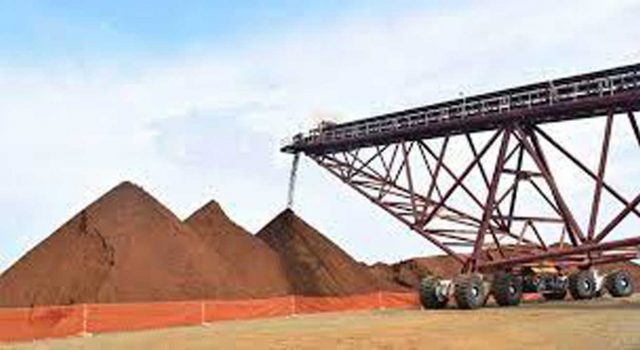Return of mining investment seen delayed after gov’t bans
By Luisa Maria Jacinta C. Jocson | Business World | January 30, 2022 10:35PM

(Photo: Business World)
THE Chamber of Mines of the Philippines (CoMP) said the recovery of investment in mining may be delayed because of the various moratoriums and shutdowns ordered on the industry over the past nine years.
“Because of the policy issues that the Philippine mining industry has faced, our country’s reputation as an investment destination took a big hit, and it will take time for investors to regain their confidence in the Philippines,” CoMP Vice-President for Communications Rocky G. Dimaculangan said in an e-mail interview.
On Dec. 23, the government lifted the four-year ban on open-pit mining, rescinding an order issued by the late Environment Secretary Regina L. Lopez, an anti-mining advocate.
In April, President Rodrigo R. Duterte lifted the nine-year moratorium on granting new mining permits.
“Foreign investment in mining allows the government access to capital and technology that are meant to benefit the nation and its people over the long term. Some exploration and mining projects require huge capital requirements, which the government does not have, and Filipino investors may not be willing or able to provide,” Mr. Dimaculangan said.
“It also takes time for a mining project to reach operational status. Apart from having to prove its financial capability to operate a large-scale mine, and we’re talking about hundreds of millions to billions of dollars here, a project has to undertake such steps as an environmental impact assessment, and to secure a social license to operate, which in our experience is the more challenging one to get. That’s why the government’s recent mining policy pronouncements are indeed most welcome developments,” he added.
Three copper-gold projects are in the pipeline for Mindanao: Silangan, Tampakan and King King, which are expected to bring in close to $5 billion in total capital investment over several years, according to CoMP.
Mining’s gross domestic product contribution is expected to increase from 0.6% to 1.5% a year, while enhancing National Government revenue by P12 billion, LGU revenue by P1.5 billion, exports by $2 billion, and social expenditures by close to P800 million a year.
“You can imagine what yearly expenditures of almost P800 million per year can do to the development of those far-flung yet highly mineralized areas that don’t see much development at all. Also, royalties to indigenous tribes of a little over P600 million a year. It is no wonder that the indigenous people in such areas have been clamoring for the start of development of these projects,” he said.
“We hope the next administration will continue policies that will help stabilize business and investment policies. Our country has a lot of catching up to do in terms of investment attractiveness compared to other mining jurisdictions all over the world,” he added.
After the ban on open-pit mining was lifted, various environmental groups criticized declared their opposition, citing the impact on the environment, changes to the landform, and the risk of acid leaks and deteriorating water quality.
With regard to sustainability, the chamber said sufficient laws in place to assure that mining does not unduly damage the environment.
“We believe that the regulatory environment governing mining is adequate. The Philippines already has among the strictest mining laws, rules and regulations in the world that impose on exploration and mining companies many social, economic, and environmental limitations and conditions. Where we can explore and mine is already well-defined. We need to secure a social license before we can explore and mine. We have to contend with voluminous environmental requirements and reports from inception to termination — and beyond — of our mining projects,” Mr. Dimaculangan said.
“In the last nine years, our government has done a thorough review of the regulatory framework of the mining industry and has put in place additional rules and regulations to enhance the industry’s productivity while increasing the protection for the environment and the benefits to host communities,” he added.
Mr. Dimaculangan said the chamber adopted the Climate Change Protocol in 2017, one of the eight protocols of the Towards Sustainable Mining (TSM) initiative.
“TSM is a set of tools and indicators to drive environmental and social performance and ensure that key mining risks are managed responsibly at members’ facilities. The program was established in 2004 by the Mining Association of Canada and its main objective is to enable mining companies to meet society’s needs for minerals and metal products in the most socially, economically, and environmentally responsible way,” he said.
The CoMP said it undertook a thorough “Filipinization” process for TSM from 2018 to 2020 to ensure the program is responsive to Philippine conditions.
Apart from Canada and the Philippines, TSM is currently being implemented in Argentina, Australia, Botswana, Brazil, Colombia, Finland, Norway, and Spain.
The Department of Environment and Natural Resources also issued a memorandum authorizing large-scale mining companies to realign their mandated social development funds, equivalent to 1.5% of operating costs, to support affected communities quarantined due to the pandemic.
“Consequently, large-scale mining companies spent over P380 million on PPEs, disinfectant, and medical supplies, as well as food assistance and supplies for social amelioration measures. This benefitted 297,491 frontliners and 1,099,090 households and families living in host communities and beyond,” Mr. Dimaculangan said.
Source: Business World

